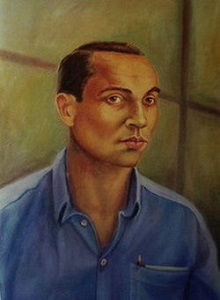De Spaanse dichter en schrijver Miguel Hernández werd geboren in Orihuela, Alicante, op 30 oktober 1910. Hernández was de zoon van een geitenhoeder en hielp zijn vader al vanaf zijn veertiende met het werk. Hij werd echter al op jonge leeftijd gegrepen door de literatuur, bracht veel tijd in de plaatselijke bibliotheek door en bestudeerde Cervantes, Lope de Vega, Calderón de la Barca en Luis de Góngora. In 1933 publiceerde hij op instigatie van een groep katholieke dichters uit zijn geboortestreek zijn eerste gedichtenbundel, “Perito en lunas” (Maanexpert).In 1934 trok Hernández naar Madrid en kwam in contact met de dichters van de ‘Generatie van ‘27’, waaronder Pablo Neruda en Vicente Aleixandre. Door hen geïnspireerd schreef hij in 1936 een bundel liefdessonnetten: “El rayo que no cesa” (De bliksem zonder eind). Zijn latere bundels “Viento del pueblo” (1937, Wind van het volk) en “El hombre acecha” (1939, De man in de hinderlaag) worden getekend door de Spaanse Burgeroorlog. Hernández steunde als communist actief de zaak van de Republikeinen en liet daarmee het katholicisme als inspiratiebron definitief achter zich. In 1937 huwde Hernández Josefina Manresa, afkomstig uit zijn geboortedorp. Ze kregen in 1938 een zoontje dat een jaar later overleed. Zijn postuum verschenen bundel “Cancionero y Romancero de Ausencias” (1938/1942, Zang en liedbundel van afwezigheden) bevat het bekend geworden “Wiegeliedje van de ui”, dat hij schreef voor zijn zoontje nadat zijn vrouw hem had verteld dat een ui het enige was wat ze voor het kindje aan voedsel had.Na de burgeroorlog, in 1939, vluchtte Hernández naar Portugal, maar werd al vlak over de grens opgepakt en uitgeleverd aan de Guardia Civil. Hij overleed in gevangenschap aan tuberculose, in 1942, op 31-jarige leeftijd. Diverse gedichten van Hernández werden in de jaren zestig en zeventig op muziek gezet door de Catalaanse zanger Joan Manuel Serrat.
The Soldier and the Snow
December has frozen its double-edged breath
and blows it down from the icy heavens,
like a dry fire coming apart in threads,
like a huge ruin that topples on soldiers.
Snow where horses have left their hoof-marks
is a solitude of grief that gallops on.
Snow like split fingernails, or claws badly worn,
like a malice out of heaven or a final contempt.
It bites, prunes, cuts through with the heavy
slash of a bloodshot and pale marble ax.
It comes down, it falls everywhere like some ruined embrace
of canyons and wings, solitude and snow.
This violence that splits off from the core of winter,
raw hunger tired of being hungry and cold,
hangs over the naked with an eternal grudge
that is white, speechless, dark, starving, and fatal.
It wants to soften down forges, hatred, flames,
it wants to stop up the seas, to bury all loves.
It goes along throwing up huge, gauzy drifts,
hostile hunks of glass, statues that say nothing.
I want the heart made of wood in every shop
and textile factory to flood over and cover
the bodies that ignite the morning
with their looks and yells, boots and rifles.
Clothes for the corpses that are able to go naked,
able to go dressed in frost and ice,
in withered stone that fights off the cruel beaks,
the pale beak thrusts and the pale escapes.
Clothes for corpses that silently fall back
the most snowy attacks with the reddest bones.
Because these soldiers have sun-fired bones,
because they are fires with footprints and eyes.
The cold hunches forward, death loses its leaves.
I can hear the noiseless sound raining down.
Red on the white snow, life turns
the steamy snow red, sows fire in the snow.
Soldiers are so much like rock crystals
that only fire, only flame shapes them,
and they fight with icy cheekbones, with their mouths,
and turn whatever they attack into memories of ash.
Vertaald door Timothy Baland
Wiegeliedje van de ui (Fragment)
De ui is ijzel
arm en gesloten.
IJzel van jouw dagen
en mijn nachten.
Honger en ui,
zwart ijs en ijzel
groot en rond.
In de wieg van de honger
lag het kind,
gevoed met
bloed van ui.
Maar jouw bloed,
bevroren met suiker,
honger en ui.
Vertaald door T. Witmaar

Miguel Hernández (30 oktober 1910 – 28 maart 1942)
Portret door Ramón Fernández Palmeral, 2011
